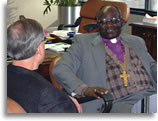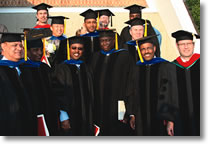by Roland Lovstad
 |
|
Dr. Walter Obare, presiding bishop of the Evangelical Lutheran Church in Kenya, is among church leaders worldwide who have received advanced degrees from our seminaries. Here, Dr. Obare chats with LCMS President Gerald B. Kieschnick.Photo by David Mahsman/LCMS World Mission |
As God prepares pastors through LCMS seminaries, He also reaches widely to draw pastors from far-flung corners of the globe to expand their knowledge and skills to strengthen and grow in their service to their Lord and the Church.
LCMS seminaries have a worldwide impact, according to the graduate deans at Concordia Theological Seminary, Fort Wayne, and Concordia Seminary, St. Louis. They tell of students from Australia, Madagascar, Myanmar, New Zealand, and other countries. Not all are from partner churches; yet, all will take home a deeper understanding of confessional Lutheran theology and a significant connection to the LCMS.
Among those who attended the seminaries’ graduate schools are Rev. Amos Bolay, acting president of the newly formed Evangelical Lutheran Church of Liberia; Dr. Walter Obare, presiding bishop of the Evangelical Lutheran Church in Kenya; and Dr. Berhanu Ofgaa, general secretary of the Ethiopian Evangelical Lutheran Church—Mekane Yesus in Ethiopia (the world’s second-largest Lutheran church body).
Today, the two seminaries enroll about 250 graduate students. Most are pastors who will apply their education in U.S. congregations and other ministries.
“What we want to do with the graduate school is provide a solid theological foundation for aspiring teachers and leaders in the Church,” explains Dr. Klaus Detlev Schulz, dean of graduate studies at the Fort Wayne seminary. He says students come seeking theological guidance and the skills to share their learning as church leaders.
Dr. Bruce Schuchard, the graduate dean at St. Louis, adds, “Our graduate school welcomes students from every denominational background in the U.S. today and virtually every corner of the world.”
Although the specifics of their curriculum and requirements are different, both seminaries offer a Master of Arts (M.A.), a Master of Sacred Theology (S.T.M.), a Doctor of Ministry (D.Min.), and a Doctor of Philosophy (Ph.D.). (Most pastors graduate from the seminary with a Master of Divinity [M.Div.] degree.)
The deans explain that their M.A. programs emphasize theology but are not designed to prepare men for pastoral ministry. The M.A. in theology also is offered as an option for deaconess students as they pursue deaconess certification.
“Our goal with our own pastors and deaconesses is to help these good candidates be even better candidates for ministry in the Church and world in the name of the LCMS today,” Schuchard says.
International students pursue the M.A. or another graduate degree as preparation for further work in their home churches. For example, Schulz notes that the Fort Wayne seminary has an M.A. student who is currently the general secretary to Dr. Obare in the Kenyan Church.
Schuchard says Bolay earned an M.A. degree. “It’s quite evident that his accomplishment in our M.A. program made it significantly possible for him to present himself as a leader.”
 |
|
Having a worldwide impact: 2009 PH.D. graduates at Concordia Theological Seminary, Fort Wayne.Photo courtesy Concordia Theological Seminary |
Schulz says most pastors, whether in the U.S. or overseas, want to continue in their education to acquire further expertise for parish ministry. That ministry focus is addressed in the D.Min. programs, which emphasize practical aspects over scholarly study and research.
“Those pursuing the S.T.M. or its more advanced counterpart, the Ph.D., generally come with a first theological degree and an interest in strengthening their skill and their foundation in the study of theology,” explains Schuchard. “Some will pursue an S.T.M., because they want to be stronger pastors, functioning with greater familiarity and expertise in preaching and teaching.” He adds that someone pursuing a Ph.D. is frequently seeking a career in teaching, leadership, or publishing.
Obare earned his M.A. from Concordia Seminary in St. Louis. Berhanu earned his Ph.D. at Concordia Theological Seminary, Fort Wayne.
“They [international students] make a contribution to our life together on our campus, an importance that can’t be overstated,” observes Schuchard. “They come with remarkable stories to tell, with lived experiences that enrich everything that we are and do together.”
Schulz says international students bring information that previously has not been encountered. For example, one student is doing a graduate dissertation on the practice of exorcism in Madagascar. Another student, from the traditionally Buddhist country of Myanmar, reports a tribe that is Christian. A recent graduate, a Presbyterian from Korea, wrote a dissertation on church music, and his section on Lutheran music was made into a book by a Korean publisher.
As he travels internationally, Schulz observes keen interest in the seminary. He cites the example of a Haitian, Rev. Doris Jean Louis, who studied at the Fort Wayne campus, discovered Lutheran theology, and was instrumental in establishing a Lutheran presence in Haiti. (Sadly, Louis, who was known as “the father of Lutheranism in Haiti,” was murdered this past March during an attempted robbery.)
“The seminaries are really pivotal in connecting or establishing partnership relations with other church bodies,” comments Schulz. While a number of the graduate students are not from Lutheran church bodies that are recognized as partner churches, he adds, “I see the seminary being a launching pad for future relationships that are established.”
Both seminaries have lists of international students who are waiting for sponsors who can help them attend the seminary, Schulz and Schuchard say.
Schuchard says every student is sure to make a significant contribution to the Church and world today. “It’s nothing short of extraordinary what these fine students represent to the future of the Church in the countries from which they come. Their chance to realize that potential depends entirely upon the financial support they’re hoping and praying they will receive.”
—
About the Author: Roland Lovstad is an editor-at-large for The Lutheran Witness and a member of Immanuel Lutheran Church, Perryville, Mo.
For More Information
About graduate programs
- e-mail schuchardb@csl.edu or schulzkd@ctsfw.edu
- see their Web sites
- www.csl.edu (St. Louis)
- www.ctsfw.edu (Fort Wayne)
About Supporting a Student
- contact the seminary development offices,
- 877-287-4338 (Fort Wayne)
- 800-822 5287 (St. Louis)





